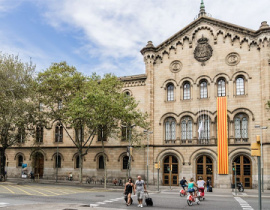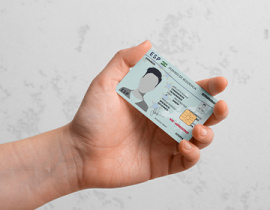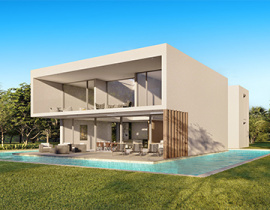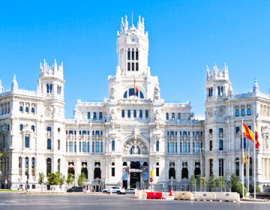- Home
- Blog
- Area Guide
- Discover Barcelona: A Complete Guide for Expats
Discover Barcelona: A Complete Guide for Expats
Barcelona is a beautiful city in Spain, located by the Mediterranean Sea. It is famous for its unique architecture, especially the works of Antoni Gaudí, like the Sagrada Família and Park Güell. The city is known for its sunny beaches, delicious food, and lively streets.
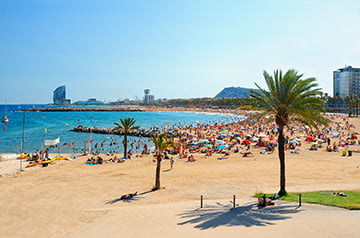 In recent years, many people have chosen to live in Barcelona. There are many factors contributing to this, ranging from the cost of living in Barcelona to the overall living conditions. Let’s explore Barcelona together!
In recent years, many people have chosen to live in Barcelona. There are many factors contributing to this, ranging from the cost of living in Barcelona to the overall living conditions. Let’s explore Barcelona together!
Things to Know About Barcelona
- Here are the key information about Barcelona;
- In Barcelona, Spanish and Catalan are the primary languages. English is also a widely used foreign language.
- The city has a typical Mediterranean climate: hot summers and mild winters.
- Barcelona is by the Mediterranean Sea and has beautiful beaches such as Barceloneta Beach and Bogatel Beach.
- In Barcelona, the minimum wage is set by Spain’s national government. As of 2024, the minimum wage in Spain is around €1,260 per month for full-time workers.
- In Barcelona, traffic flows on the right-hand side of the road, similar to most of Europe.
- The city celebrates many festivals throughout the year, like La Mercè and Sant Jordi's Day.
- Barcelona has a lively nightlife with many bars, clubs, and late-night restaurants.
- Transportation in Barcelona is well-developed including buses, trams, and a metro system.
- The city has a rich cultural history with historic neighborhoods like the Gothic Quarter.
- Pickpocketing can be common in tourist areas, so be cautious with your belongings.
Why Expats Choose Barcelona?
.jpg) Many expats choose Barcelona because of its vibrant culture, beautiful Mediterranean climate and affordable living expenses. With its lively streets, rich history, and numerous festivals, Barcelona provides a unique experience that attracts people from all over the world.
Many expats choose Barcelona because of its vibrant culture, beautiful Mediterranean climate and affordable living expenses. With its lively streets, rich history, and numerous festivals, Barcelona provides a unique experience that attracts people from all over the world.
The price of living in Barcelona can vary widely. Renting an apartment in the city center is often quite expensive, while outer neighborhoods can be more affordable. Besides housing, daily expenses like groceries and dining out can be reasonable compared to other major cities in Europe.
Living in Barcelona as an expat can be a rewarding experience. The city has a welcoming atmosphere and a strong expat community. Many people find it easy to integrate into local life, thanks to the city’s international vibe and the availability of services for newcomers.
What to Expect in Expat Life in Barcelona?
As expected, living in a foreign country comes with both challenges and opportunities, and Barcelona is no exception. Here, we will outline the advantages and potential disadvantages of living in Barcelona as an expat to provide a clearer understanding of what to expect.
A Relaxed Lifestyle
Barcelona has a relaxed yet lively lifestyle. The city's focus on outdoor activities, dining, and culture will shape your daily life. You should also remember that most places are closed on Sundays, and many businesses take a siesta during the afternoon on working days.
Lively Cultural Experience
.jpg) Barcelona has a rich cultural heritage with unique traditions, festivals, and local customs. You may expect to be surrounded by Catalan and Spanish culture. Learning some Catalan can enhance your experience and help you connect with locals.
Barcelona has a rich cultural heritage with unique traditions, festivals, and local customs. You may expect to be surrounded by Catalan and Spanish culture. Learning some Catalan can enhance your experience and help you connect with locals.
A Welcoming Community and Active Social Life
Barcelona has a vibrant expat community. You’ll find various social events, groups, and activities to help you connect with others and make friends. The city’s lively nightlife, diverse dining options, and numerous cultural events offer plenty of opportunities for socializing.
Average Cost of Living but Mostly Affordable
Living in Barcelona can be high for expenses, particularly for housing in central areas. You should plan to budget carefully, as rent, dining out, and other expenses can add up. However, grocery prices and public transport are generally more affordable compared to other major European cities.
A Delicious Cuisine
Barcelona’s cuisine is delightful with fresh seafood, such as paella and tapas, featuring ingredients like olives, tomatoes, and garlic. Traditional dishes like "pan con tomate" (tomato bread) and "crema catalana" (a creamy dessert) highlight the region’s culinary heritage.
A Well-Developed Transportation
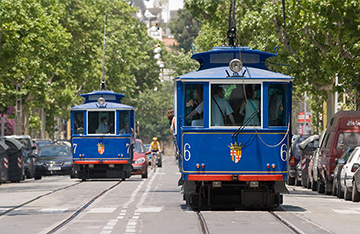 The city has an efficient public transport system, including buses, trams, and metro. Biking and walking are also popular, and many neighborhoods are pedestrian-friendly. Public transportation ticket prices start from €2.50.
The city has an efficient public transport system, including buses, trams, and metro. Biking and walking are also popular, and many neighborhoods are pedestrian-friendly. Public transportation ticket prices start from €2.50.
Healthcare for Everyone
Barcelona has a well-regarded healthcare system with both public and private options. Expats with residency can access public healthcare, though many opt for private insurance for quicker service and English-speaking doctors.
Education at All Levels
Barcelona education offers a variety of options for expat families, including international schools with curricula in English and local public and private schools that teach in Catalan or Spanish. The city is also home to well-regarded universities.
Safe but Still be Careful
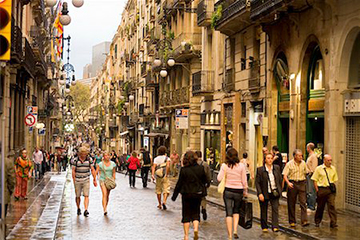 While Barcelona is generally safe, be mindful of pickpocketing, especially in crowded tourist areas. Taking precautions with your belongings can help prevent theft.
While Barcelona is generally safe, be mindful of pickpocketing, especially in crowded tourist areas. Taking precautions with your belongings can help prevent theft.
Bureaucracy Could be Complex
Dealing with local bureaucracy, such as obtaining residency permits or registering with local authorities, can be complex. It’s helpful to seek advice or assistance to navigate these processes effectively.
Job Opportunities for English Speakers
English-speakers expats in Barcelona find jobs, especially in tech, tourism, education, and international business. English-speaking roles are common in customer service, IT, and teaching.
Best Places to Live as an Expat in Barcelona
Here are the some of neighborhoods in Barcelona. Each of these neighborhoods has its own unique character and benefits, so the best choice will depend on your personal preferences and lifestyle.
- Eixample
A central location with easy access to shops, restaurants, and cultural sites. The area is well-connected by public transport.
- Gràcia
It is a bohemian neighborhood with a relaxed atmosphere. This area is ideal for those who enjoy a more laid-back lifestyle while still being close to the city center. In addition, this area stands out with reasonably priced apartments.
- Gothic Quarter (Barri Gòtic)
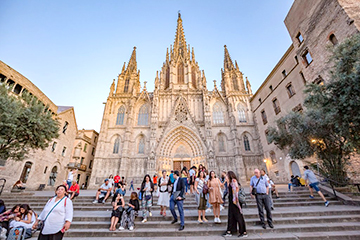 It’s a vibrant area with plenty of cafes, bars, and cultural attractions. It’s perfect for those who enjoy being in the heart of Barcelona’s history.
It’s a vibrant area with plenty of cafes, bars, and cultural attractions. It’s perfect for those who enjoy being in the heart of Barcelona’s history.
- El Born
It’s a lively area popular with younger expats and offers a mix of historical charm and modern amenities. If you’re a student, you should look around the area for affordable housing options.
- Poble Sec
Located at the foot of Montjuïc hill, it offers a more residential feel while still being close to the city center. It offers a more reasonable cost of living compared to more central and upscale areas.
- Sarrià-Sant Gervasi
This neighborhood is known for its quiet, residential atmosphere, high-quality amenities, and good schools. It’s popular among families and professionals looking for a more suburban feel while still being accessible to central Barcelona.
- Vila Olímpica
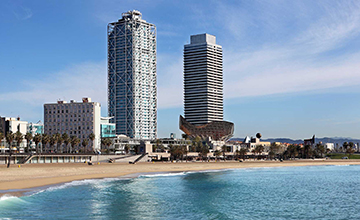 Located near the beach, it is a modern area with a mix of residential and leisure spaces.
Located near the beach, it is a modern area with a mix of residential and leisure spaces.
Visa in Barcelona
The visa requirements are based on your nationality and the purpose of your visit.
For EU Citizens
Short Stays: EU citizens do not need a visa to visit Barcelona for short stays (up to 90 days).
Long Stays: For stays longer than 90 days, EU citizens do not need a visa but must register with local authorities and obtain a residence certificate.
For Non-EU Citizens
Short Stays: Non-EU citizens may need a Schengen visa for short visits (up to 90 days). This visa allows travel to Barcelona and other Schengen countries.
Long Stays: For stays longer than 90 days, non-EU citizens need a visa appropriate to their purpose of stay (e.g., student visa, work visa, or residence visa). They must apply for this visa at the Spanish consulate or embassy in their home country.
Residence Permit in Barcelona
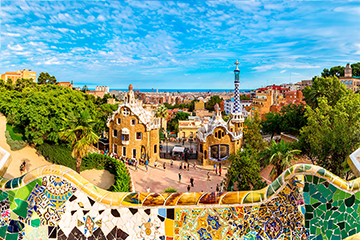 To gain a residence permit in Barcelona, the process depends on your nationality and the purpose of your stay. Non-EU citizens benefit from the residence permit in Spain by applying for a work, visa, student visa, or non-lucrative visa and etc.
To gain a residence permit in Barcelona, the process depends on your nationality and the purpose of your stay. Non-EU citizens benefit from the residence permit in Spain by applying for a work, visa, student visa, or non-lucrative visa and etc.
FAQs
Q: What are the average monthly rent costs in Barcelona?
A: Rent costs vary by neighborhood. On average, a one-bedroom apartment in the city center costs around €1,200 to €1,500 per month. In more affordable areas or outside the city center, rents can range from €800 to €1,200 per month.
Q: Is Barcelona expensive for students compared to other cities?
A: Barcelona's living expenses are generally considered moderate for students. While it is more affordable than some major European cities like London or Paris, it can be pricier than smaller Spanish cities.
Q: What are the benefits of living in Barcelona as an expat?
A: Expats in Barcelona enjoy a Mediterranean climate, rich cultural experiences, excellent food, and a lively social scene. The city has a strong expat community, making it easier to connect with others and adapt to life in Spain.
Q: Do I need a visa to go to Barcelona?
A: Whether you need a visa to visit Barcelona depends on your nationality and the length of your stay.




